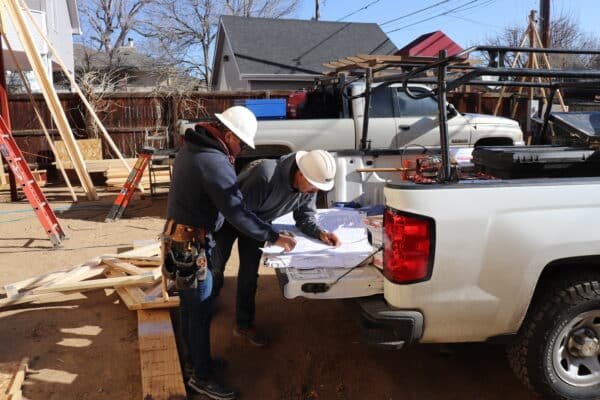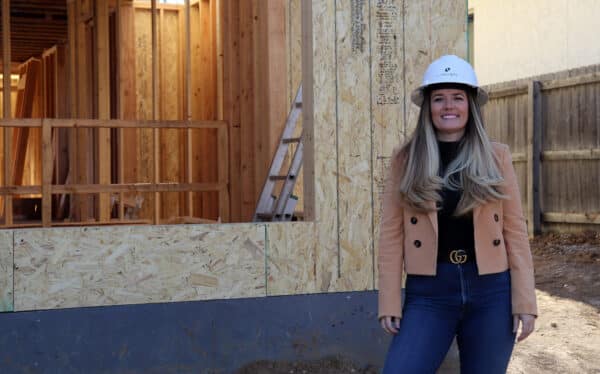Denver’s years-long building permit delay is scaring off homeowners who might want to build and homebuilders who must navigate the Kafka-esque system.
Chris Withers, the owner of Old Greenwich Builders, said he knows one property owner who sold her property in Southern Hills after waiting more than eight months for a permit. She’d planned to scrape the existing home and build a $3 million new one.
“Knowing they can’t break ground for more than a year is untenable for many people,” Withers says. “Then you have the build time, so it could be three years before you can walk in the door. It’s easier to go buy a house that’s done and ready to move in.”
Old Greenwich typically builds four homes and remodels four homes each year. Prices range from $500,000 for remodeling to $3 million to build a new home. The company has worked in every Denver neighborhood and also builds in Cherry Hills Village and Greenwood Village.
Dublin Development has had the same experience with buyers deciding against building rather than waiting for permits.
Dublin builds a mix of 25 to 50 units per year, including condos, apartments, townhomes, and single-family homes in the Sloan’s Lake, Jefferson Park, Highlands, RiNo, Wash Park, Cory-Merrill, Observatory Park, Baker, Hilltop and Cherry Creek neighborhoods. Prices range from $500,000 to $5 million.
“We will continue building in Denver, but we’re also working in other communities that are more developer or builder friendly, like Littleton and Arvada,” said Shawn Bookout, Dublin Development co-founder.
Lauren Browne, Larsen Development operations director, said she gets weekly calls from potential buyers who want a spec home instead of waiting four to six months for a building permit.
Delays started before pandemic … no human touch
Morgan Cullen, director of government affairs at the Home Builders Association of Metro Denver, said in 2019, the city processed residential building permits in two to three weeks.
During the pandemic, the process — with two or more reviews — could take 10 months to a year.
“These delays directly contribute to significant delays in construction that, in turn, slow down the ability to bring new homes to market and increase prices,” Cullen said.
According to the city planning department’s dashboard, as of March 13, major residential projects, which include new homes and additions that are 400 square feet or larger, take 13 weeks for the initial review and 11 weeks for the resubmittal review.
But builders say they rarely get approval that quickly.
Bryan Bozeman, Stonecloud Design Build executive manager, said the timing varies. And while he’s had plans approved in two rounds, it usually takes three or four.
“The city used to say it would take eight weeks for the initial review and then two weeks for resubmittal. That did not always happen, but it was better than now,” Bozeman said.
Browne, with Larsen, said her company uses a robust checklist before submitting plans and usually gets approval after answering the first round of comments, but it also had applications that took three rounds of review.
“Pre-COVID, we could get in front of a reviewer and have them answer the phone as they did not work from home,” Browne said.
Builders say Denver’s permit process time started stretching from a few weeks about five years ago when the city switched to an online filing system.
Browne estimates she spent 20 to 30 percent of her time at the permit office, where she could talk in person with the individual reviewing the building plan before the city implemented its online system.
“With the online system, you lose that human aspect,” she said.
Larsen, which builds 10 to 12 homes per year priced at $3 million to $12 million, has projects underway in Crestmoor, Hilltop, Wash Park, Belcaro, Castle Pines, Bow Mar, Cherry Hills and Columbine Valley.
“The reviewers need to catch up and keep up,” said Bozeman, of Stonecloud, which builds three to six homes yearly for $1.5 million to $5 million plus, depending on size and scope. The company builds homes in Denver in Washington Park, Observatory Park, Bonnie Brae and Cory-Merrill.
Like Browne, he misses being able to talk with reviewers.
“If you have a question, trying to talk to someone is impossible,” he said. “You used to be able to go down and talk to the reviewer and ask questions about their comments. Now they work from home, and you can’t talk to a human being and get an explanation.
“Instead, you take a stab at trying to address their comments, but you might not be answering their concerns.”
What’s most frustrating is the back and forth when you can’t talk to the reviewer, he said.
“You get a permit back with questions, you answer those questions, and then they come back with more questions on a different subject. When you review the plan, you need to review it and find everything you can.”
The problem only got worse when the pandemic hit.
During the pandemic, Denver eliminated some positions and froze hiring. But construction didn’t slow down, and builders kept filing permit applications.
When the city resumed hiring in late 2021, it faced a tough labor market and struggled to fill vacancies, said Laura Swartz, communications director for Denver Community Planning and Development.
The department hired 108 people and approved overtime to catch up. The city also hired and now uses third-party plan review services to help manage the application backlog, focusing on residential plan reviews.
The department scheduled a blitz in late January when reviewers focused on single-family and duplex plans. From Jan. 23-27, the residential team doubled its productivity and completed 654 reviews. During a typical week, the reviewers complete 334 reviews, Swartz said.
But the department’s still behind.
Suggestions for improving the process
Builders want to see Denver streamline the review process.
First, while they appreciate reviewers having some autonomy, it’s frustrating that each interprets city code differently.
“Before we submit plans, we use a standard checklist to make sure we’re addressing issues that came up in the past, but with so many new reviewers, they find different things every time,” Browne said.
Bozeman says basic projects take too long to review.
“It shouldn’t be difficult for them to look at a single-family residential plan on a rectangular lot with prescribed setbacks. That seems like something a reviewer should be able to get through in a day,” he said.
“Instead, it takes nine to 10 months to get permits for strictly residential projects on a standard 50 x 125 lot,” Bozeman said.
Bozeman said the city also could charge more for building permits or offer an additional charge for expedited service so it could hire more reviewers.
“That would still be more cost-effective for someone building new,” he said.
Delays hurt business
Bookout said that waiting for 12 months or more for approval on single-family home plans or 18 months or more for condos creates more risk for builders.
“If we’re funding the deal, it ties up our money for longer. If you’re trying to bring in investors, it’s hard to sell a 2.5-year turnaround.”
Bozeman agreed and said the permit delays make the upfront costs of building prohibitive.
“When you’re spending $700,000 to $1.5 million to buy a lot, sitting on that money for more than a year before you can even get started is a nightmare.”
Despite the risk and headache, some Denver homeowners who want to live in specific neighborhoods may be more understanding, Browne said.
“People who want to be in Wash Park, Hilltop or Crestmoor want to be in that neighborhood, so they’re willing to wait.”
And at least one property owner is using the threat of long waits as part of the marketing pitch.
The $2.2 million listing for 755 S. Jackson St. includes the land and an already city-approved building plan for a 7,348-square-foot ranch home. The new owner still needs final approval for the plan from the Belcaro neighborhood association’s architectural committee, said Arnie Stein with RE/MAX Master Millennium.
But once they secure that, construction could start with the planned builder — Withers of Old Greenwich Builders, or the buyers could choose their contractor.
“The new owner has the opportunity to save time and money by using the plans, with the opportunity to tweak the interior,” Stein said.
Denver’s years-long building permit delay is scaring off homeowners who might want to build and homebuilders who must navigate the Kafka-esque system.
Chris Withers, the owner of Old Greenwich Builders, said he knows one property owner who sold her property in Southern Hills after waiting more than eight months for a permit. She’d planned to scrape the existing home and build a $3 million new one.
“Knowing they can’t break ground for more than a year is untenable for many people,” Withers says. “Then you have the build time, so it could be three years before you can walk in the door. It’s easier to go buy a house that’s done and ready to move in.”
Old Greenwich typically builds four homes and remodels four homes each year. Prices range from $500,000 for remodeling to $3 million to build a new home. The company has worked in every Denver neighborhood and also builds in Cherry Hills Village and Greenwood Village.
Dublin Development has had the same experience with buyers deciding against building rather than waiting for permits.
Dublin builds a mix of 25 to 50 units per year, including condos, apartments, townhomes, and single-family homes in the Sloan’s Lake, Jefferson Park, Highlands, RiNo, Wash Park, Cory-Merrill, Observatory Park, Baker, Hilltop and Cherry Creek neighborhoods. Prices range from $500,000 to $5 million.
“We will continue building in Denver, but we’re also working in other communities that are more developer or builder friendly, like Littleton and Arvada,” said Shawn Bookout, Dublin Development co-founder.
Lauren Browne, Larsen Development operations director, said she gets weekly calls from potential buyers who want a spec home instead of waiting four to six months for a building permit.
Delays started before pandemic … no human touch
Morgan Cullen, director of government affairs at the Home Builders Association of Metro Denver, said in 2019, the city processed residential building permits in two to three weeks.
During the pandemic, the process — with two or more reviews — could take 10 months to a year.
“These delays directly contribute to significant delays in construction that, in turn, slow down the ability to bring new homes to market and increase prices,” Cullen said.
According to the city planning department’s dashboard, as of March 13, major residential projects, which include new homes and additions that are 400 square feet or larger, take 13 weeks for the initial review and 11 weeks for the resubmittal review.
But builders say they rarely get approval that quickly.
Bryan Bozeman, Stonecloud Design Build executive manager, said the timing varies. And while he’s had plans approved in two rounds, it usually takes three or four.
“The city used to say it would take eight weeks for the initial review and then two weeks for resubmittal. That did not always happen, but it was better than now,” Bozeman said.
Browne, with Larsen, said her company uses a robust checklist before submitting plans and usually gets approval after answering the first round of comments, but it also had applications that took three rounds of review.
“Pre-COVID, we could get in front of a reviewer and have them answer the phone as they did not work from home,” Browne said.
Builders say Denver’s permit process time started stretching from a few weeks about five years ago when the city switched to an online filing system.
Browne estimates she spent 20 to 30 percent of her time at the permit office, where she could talk in person with the individual reviewing the building plan before the city implemented its online system.
“With the online system, you lose that human aspect,” she said.
Larsen, which builds 10 to 12 homes per year priced at $3 million to $12 million, has projects underway in Crestmoor, Hilltop, Wash Park, Belcaro, Castle Pines, Bow Mar, Cherry Hills and Columbine Valley.
“The reviewers need to catch up and keep up,” said Bozeman, of Stonecloud, which builds three to six homes yearly for $1.5 million to $5 million plus, depending on size and scope. The company builds homes in Denver in Washington Park, Observatory Park, Bonnie Brae and Cory-Merrill.
Like Browne, he misses being able to talk with reviewers.
“If you have a question, trying to talk to someone is impossible,” he said. “You used to be able to go down and talk to the reviewer and ask questions about their comments. Now they work from home, and you can’t talk to a human being and get an explanation.
“Instead, you take a stab at trying to address their comments, but you might not be answering their concerns.”
What’s most frustrating is the back and forth when you can’t talk to the reviewer, he said.
“You get a permit back with questions, you answer those questions, and then they come back with more questions on a different subject. When you review the plan, you need to review it and find everything you can.”
The problem only got worse when the pandemic hit.
During the pandemic, Denver eliminated some positions and froze hiring. But construction didn’t slow down, and builders kept filing permit applications.
When the city resumed hiring in late 2021, it faced a tough labor market and struggled to fill vacancies, said Laura Swartz, communications director for Denver Community Planning and Development.
The department hired 108 people and approved overtime to catch up. The city also hired and now uses third-party plan review services to help manage the application backlog, focusing on residential plan reviews.
The department scheduled a blitz in late January when reviewers focused on single-family and duplex plans. From Jan. 23-27, the residential team doubled its productivity and completed 654 reviews. During a typical week, the reviewers complete 334 reviews, Swartz said.
But the department’s still behind.
Suggestions for improving the process
Builders want to see Denver streamline the review process.
First, while they appreciate reviewers having some autonomy, it’s frustrating that each interprets city code differently.
“Before we submit plans, we use a standard checklist to make sure we’re addressing issues that came up in the past, but with so many new reviewers, they find different things every time,” Browne said.
Bozeman says basic projects take too long to review.
“It shouldn’t be difficult for them to look at a single-family residential plan on a rectangular lot with prescribed setbacks. That seems like something a reviewer should be able to get through in a day,” he said.
“Instead, it takes nine to 10 months to get permits for strictly residential projects on a standard 50 x 125 lot,” Bozeman said.
Bozeman said the city also could charge more for building permits or offer an additional charge for expedited service so it could hire more reviewers.
“That would still be more cost-effective for someone building new,” he said.
Delays hurt business
Bookout said that waiting for 12 months or more for approval on single-family home plans or 18 months or more for condos creates more risk for builders.
“If we’re funding the deal, it ties up our money for longer. If you’re trying to bring in investors, it’s hard to sell a 2.5-year turnaround.”
Bozeman agreed and said the permit delays make the upfront costs of building prohibitive.
“When you’re spending $700,000 to $1.5 million to buy a lot, sitting on that money for more than a year before you can even get started is a nightmare.”
Despite the risk and headache, some Denver homeowners who want to live in specific neighborhoods may be more understanding, Browne said.
“People who want to be in Wash Park, Hilltop or Crestmoor want to be in that neighborhood, so they’re willing to wait.”
And at least one property owner is using the threat of long waits as part of the marketing pitch.
The $2.2 million listing for 755 S. Jackson St. includes the land and an already city-approved building plan for a 7,348-square-foot ranch home. The new owner still needs final approval for the plan from the Belcaro neighborhood association’s architectural committee, said Arnie Stein with RE/MAX Master Millennium.
But once they secure that, construction could start with the planned builder — Withers of Old Greenwich Builders, or the buyers could choose their contractor.
“The new owner has the opportunity to save time and money by using the plans, with the opportunity to tweak the interior,” Stein said.




